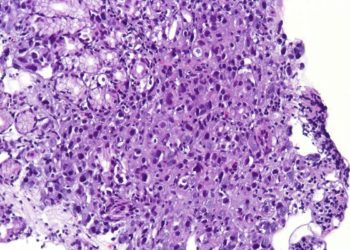Lack of sentinel-lymph node biopsy does not alter survival in early invasive breast cancer
1. In this randomized, non-inferiority trial, the omission of surgical axillary staging was noninferior to sentinel lymph node biopsy in patients with clinically node-negative, T1 or T2 invasive breast cancer.
2. Patients with omission of surgical axillary staging had lower incidence of adverse effects.
Evidence Rating Level: 1 (Excellent)
Study Rundown: Axillary lymph node status has been deemed one of the most important prognostic factors in invasive breast cancer. With tumor size, nodal status has been used to guide decisions on systemic therapy. Several randomized trials have been conducted to assess the omission of axillary surgery in patients with clinically node-negative breast cancer who undergo up-front breast-conserving surgery. This prospective, randomized, non-inferiority trial assessed whether the complete omission of axillary surgery in early-stage breast cancer treated with breast-conserving surgery was noninferior to sentinel lymph node biopsy concerning invasive free survival. Those with clinically node-negative invasive breast cancer staged as T1 or T2 were randomized in a 1:4 ratio to undergo either treatment without axillary surgery (surgery omission group) or sentinel lymph node biopsy (surgery group). All patients underwent unilateral breast-conserving surgery with postoperative whole breast irradiation. The primary outcome of this study was invasive disease-free survival. Results from this study found that the omission of surgical axillary staging was noninferior to sentinel lymph node biopsy in patients with clinically node-negative T1 or T2 invasive breast cancer. Limitations of this study include the patient population being restricted to low-risk patients and the follow-up potentially missing late recurrences of HR-positive disease.
Click here to read the study in NEJM
In-Depth [randomized controlled trial]: This randomized, noninferiority trial whether the complete omission of axillary surgery in early-stage breast cancer treated with breast-conserving surgery was noninferior to sentinel-lymph node biopsy concerning disease-free survival. To show the noninferiority of the omission group, the five-year invasive disease-free survival rate had to be at least 85% and the upper limit of the confidence interval for the hazard ratio for invasive disease or death had to be below 1.271. Adult women with a clinical tumor stage of T1 or T2 and node-negative status who planned to undergo upfront breast-conserving surgery were eligible for this trial. A total of 5502 were randomized in a 1:4 ratio to either undergo treatment without axillary surgery (surgery omission group, n=962) or undergo sentinel lymph node biopsy (surgery group, n=4,858). The median follow-up for this study was 73.6 months. The primary outcome analysis estimated that the five-year invasive disease-free survival was 91.9% (95% confidence interval [CI], 89.9 to 93.5) among patients in the surgery omission group and 91.7% (95% CI 0.73 to 1.14) in the surgery group. This was below the prespecified noninferiority margin. The primary analysis showed apparent differences between the surgery omission and surgery group in the incidence of axillary recurrence (1% vs 3%) and death (1.4% vs 2.4%). Safety analyses indicated that patients in the surgery omission group had a lower incidence of adverse effects, such as lymphedema, arm immobility, and pain with movement. Overall, results from this study found that omission of surgical axillary staging was noninferior to sentinel-lymph node biopsy after a median follow-up of six years in patients with clinically node-negative, T1 or T2 invasive breast cancer.
Image: PD
©2025 2 Minute Medicine, Inc. All rights reserved. No works may be reproduced without expressed written consent from 2 Minute Medicine, Inc. Inquire about licensing here. No article should be construed as medical advice and is not intended as such by the authors or by 2 Minute Medicine, Inc.









